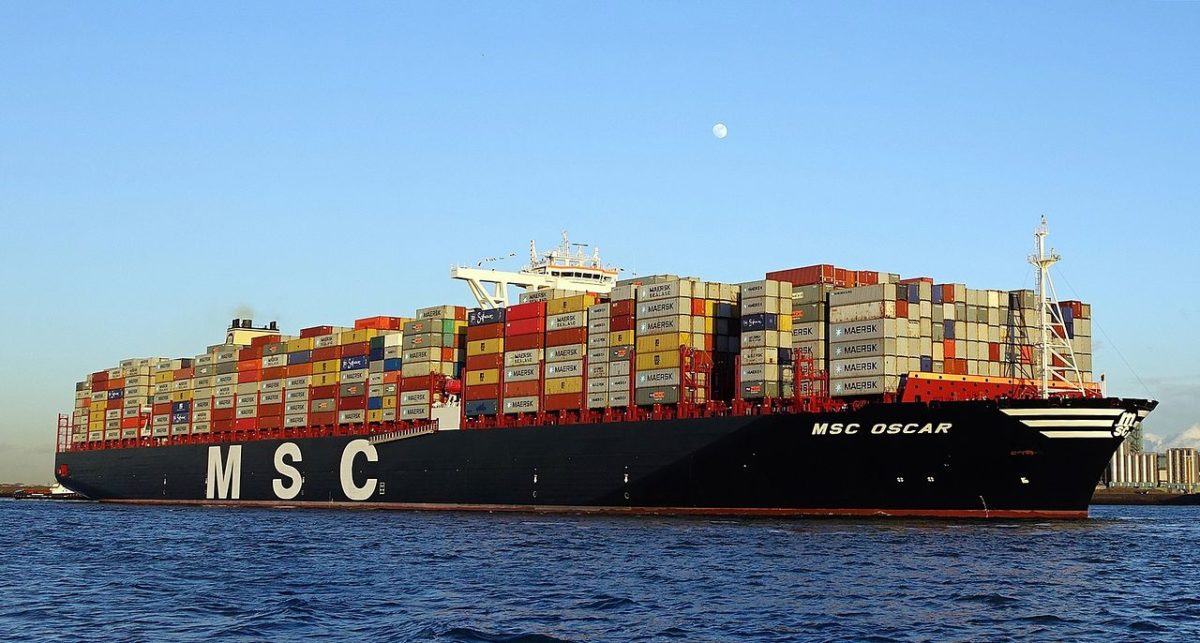Delivered in November 2014, MSC Oscar can carry a record 19,224 TEUs. Photo: kees torn
By David Fickling
(Bloomberg Gadfly) — Think China’s plans to build railways across central Asia will be a boon for global trade? Consider this: The mighty Trans-Siberian Railway carried about as much east-west container traffic last year as you’d get on a single boat.
In a single voyage, MSC Oscar can carry: 2.4 million microwave ovens.
Transit container traffic over the network amounted to 109,000 20-foot equivalent units in 2015, its owner Russian Railways said last month. The world’s biggest container ship, the MSC Oscar, can carry 19,224 TEUs and takes about two months to make the return trip from Asia to Europe.
That should be a cautionary tale for those expecting great things from President Xi Jinping’s plans to build a revived overland Silk Road between China and the west. Maritime trade may not be sexy, but right now it’s a lot cheaper to move things round the world on the high seas than on a train.
China’s existing trade is a decent guide. Freight volumes through its major ports comfortably outstrip total rail-freight traffic through its border provinces, according to data compiled by Bloomberg — and that comparison heavily skews things in rail’s favor, given how much of the land-based traffic is domestic.
To be sure, the disparity is recognized by China. Land-based spending forms the ‘belt’ in Xi’s ‘One Belt, One Road’ policy while the ‘road’, confusingly, consists of maritime projects such as a planned $10 billion upgrade at Malacca port in Malaysia. The $40 billion Silk Road Fund and $100 billion Asian Infrastructure Investment Bank established by Beijing will be financing both.
While China has traded with the west via central Asia since antiquity, it’s likely that even then ocean routes through hubs in southern India were taking the bulk of the traffic. A single Roman cargo ship could shift 350 metric tons or more, about what can be carried by 4,000 camels. Writing around the lifetime of Jesus, the Greek geographer Strabo noted that about 120 ships a year were sailing from Egypt to India. The first Roman ambassadors to China appear to have arrived by sea in the second century A.D., carrying ivory, rhinoceros horn and turtle shells that seem to have been picked up in India, Southeast Asia or Africa.
For all that the global shipping industry is in the doldrums, infrastructure investors tempted to come in on Xi’s projects should stick to the high seas.
With the exception of some much needed oil and gas-export infrastructure, most of China’s planned investments in central Asia seem to have limited economic logic. Arguably, they’re more about deepening ties with regional governments, providing work for Chinese industrial companies and damping separatist tendencies in its own Xinjiang province.
A much-touted rail link between Madrid and the Chinese city of Yiwu southwest of Shanghai had carried just eight trains-full of Spanish exports in its first 15 months in operation, El Pais newspaper reported in March. With ocean-freight rates running about a third cheaper than rail, even the offer of free advertising on Chinese state-run television for companies that use the route hasn’t sparked much traffic.
Long railway journeys through expansive Kazakh steppe sound terribly romantic. When it comes to real trade, though, shipping is always going to be where it’s at.
This column does not necessarily reflect the opinion of Bloomberg LP and its owners.
© 2016 Bloomberg L.P

 Join The Club
Join The Club











